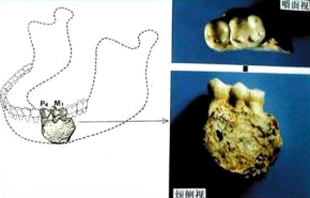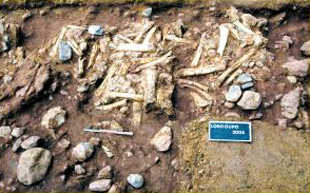Chinese archaeologists say they have found the fossilized remains of a primitive human species that lived about 2.04 million years ago in the Three Gorges Area of southwest China, the earliest ever found in the country.
The Yuanmou man, discovered in southwestern Yunnan Province in the 1960s, was previously recognized as China's earliest human species. However, these findings, including a lower jawbone fragment, an incisor, and more than 230 pieces of stone tools, prove this species, named the Wushan man, was more than 300,000 years older than Yuanmou.
An expert team led by Huang Wanbo, a professor with the Institute of Vertebrate Paleontology and Paleoanthropology under the Chinese Academy of Sciences, reached the conclusion after more than two decades of excavation at the Longgupo Site in Wushan County, Chongqing Municipality.
"It's an exciting discovery because it may rewrite China's history," said Huang.
Huang said his team unearthed the human fossils during their first excavation, from 1985 to 1988. In the same stratigraphic interval, they also discovered fossils of 120 species of vertebrates, including 116 mammals, and a large number of stone artifacts.
"Various dating techniques corroborate the geological layer containing the Wushan Man fossils being as old as 2 million to 2.04 million years, but we think we need more evidence," said Huang.
Huang's team conducted two excavations from 1997 to 1999 and from 2003 to 2006 at the Longgupo Site with partners from Britain, Canada, and France.
They found more stone tools and animal fossils dating back 2 million years in the same stratigraphic interval in which Wushan Man fossils were found before, and also in the upper layers.
"The most important findings are the many leg fossils of animals, such as the elephant, rhinoceros, and deer fossils we found in an area of no more than two square meters," said Huang.
"It is not natural that the fossils, all legs, were arranged in layers in such a small space. Only an animal with thinking capacity could do it in that way," he said.
The Three Gorges area was once an expanse of hilly land with luxuriant vegetation and a warm, humid climate in which various vertebrates and mammals lived and thrived.
"It was just in such a natural environment that the Wushan Man led a primitive life by hunting and gathering. When night fell, the inhabitants returned to the Longgupo Cave, enjoying the fruits of their day's labor," said Huang.
Located on Wushan Mountain, the Longgupo Site is considered one of the best-preserved Paleolithic sites in China and even Asia, with a wealth of primitive cultural relics.
Huang said they plan a fourth excavation at the Longgupo Site next year, which is expected to yield more evidence of the Wushan Man.
(Xinhua News Agency November 14, 2007)



